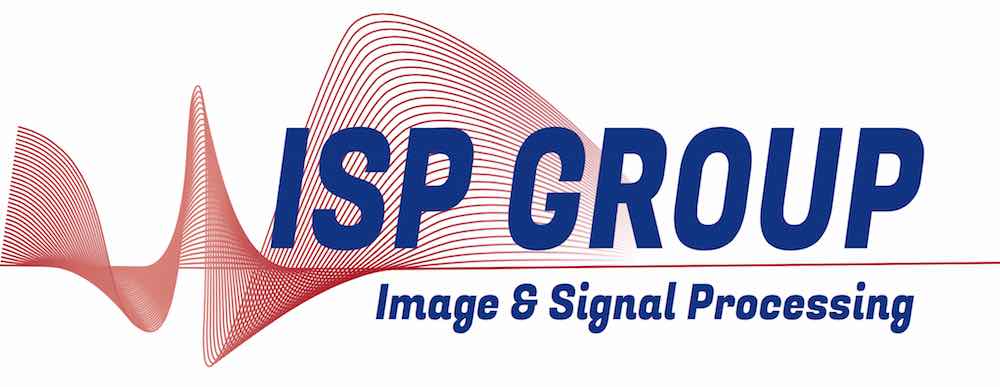The ISPGroup organizes regular seminars, reading and watching groups through, respectively,
- the ISP Seminars (ISPS),
- the IMAGe processINg rEading group (IMAGINE),
- and the Gauss'IP watching group.
ISP Seminars (ISPS)

The ISP Seminars (ISPS) aim at jointly motivating PhD students to present their research (or another research of interest) and inviting external speakers on more specialized topics. They usually focus on intelligent vision, inverse problems and sparsity, biomedical signal & medical image processing, community detection for hierarchical image segmentation, biomedical date analysis and medical imaging. Generally, the ISP Seminars take place in the Shannon seminar room (M-a105), Building Maxwell, 1st floor, place du Levant 3, Louvain-la-Neuve.
Upcoming seminars
Previous seminars
Exact Continuous Relaxations of $L_0$-Regularized Generalized Linear Models
Emmanuel Soubies (IRIT, CNRS, Université de Toulouse)
22 August 2024
External Web page: https://www.irit.fr/~Emmanuel.Soubies/
Euler seminar room (a.002) -- Thursday, 22 August 2024 at 14:00 (50 min.)
Computational Imaging: Restoration Deep Networks as Implicit Priors
Ulugbek Kamilov (Washington University, St. Louis, USA)
28 May 2024
Biography: Ulugbek Kamilov is the Director of Computational Imaging Group and an Associate Professor of Electrical & Systems Engineering and Computer Science & Engineering at Washington University in St. Louis. He is currently a Visiting Professor at the Data Science Center at École Normale Supérieure in Paris. He obtained the BSc/MSc degree in Communication Systems in 2011 and the PhD degree in Electrical Engineering in 2015 from EPFL. He was a Visiting Research Faculty at Google Research in 2023-2024 and a Research Scientist at Mitsubishi Electric Research Laboratories in 2015-2017. He was an Exchange Student at Carnegie Mello University in 2008, Visiting Student Researcher at MIT in 2011, and Visiting Scholar at Stanford University in 2013.
He is a recipient of the NSF CAREER Award and the IEEE Signal Processing Society’s 2017 Best Paper Award. He was among 55 early-career researchers in the USA selected as a Fellow for the Scialog initiative on “Advancing Bioimaging” in 2021. His PhD thesis was selected as a finalist for the EPFL Doctorate Award in 2016. He was awarded Outstanding Teaching Award from the Department of Electrical & Systems Engineering at WashU in 2023. He is currently a Senior Member of the Editorial Board of IEEE Signal Processing Magazine and is on IEEE Signal Processing Society’s Bioimaging and Signal Processing Technical Committee. He has previously servedas an Associate Editor of IEEE Transactions on Computational Imaging and on IEEE Signal Processing Society’s Computational Imaging Technical Committee.
External Web page: https://engineering.wustl.edu/faculty/Ulugbek-Kamilov.html
Shannon seminar room (Maxwell) -- Tuesday, 28 May 2024 at 14:00 (45 min.)
AI in computational imaging: from algorithms to radio astronomy
Yves Wiaux (Heriot-Watt University Edinburgh, UK)
23 February 2024
Biography: Yves Wiaux received the MSc degree in Physics and the PhD degree in Theoretical Physics from the Université catholique de Louvain (UCL, Louvain-la-Neuve) in Belgium, in 1999 and 2002 respectively. He was a Senior Researcher at the Signal Processing Laboratories of the Ecole Polytechnique Fédérale de Lausanne (EPFL) in Switzerland from 2003 to 2013, where he created the Biomedical and Astronomical Signal Processing (BASP) group. In 2013, he moved as an Associate Professor at the School of Engineering and Physical Sciences of Heriot-Watt University where he currently runs the BASP group. He was promoted to Professor at Heriot-Watt in 2016. He is also an Academic Guest at EPFL and a Honorary Fellow at the University of Edinburgh (UoE). Among other responsibilities, Prof. Wiaux chairs the “BASP Frontiers” Conference series, and is an Associate Editor of the IEEE “Transactions in Computational Imaging” (TCI) journal and of the “Royal Astronomy Society Techniques and Instruments” (RASTI) journal. Since 2010, he has led numerous research projects funded by both the Swiss National Science Foundation (SNSF) and the UK Research and Innovation Councils (UKRI). The ethos of Prof. Wiaux’s BASP group is to develop cutting-edge research in computational imaging, from theory and algorithms to applications in astronomy and medicine.
External Web page: https://researchportal.hw.ac.uk/en/persons/yves-wiaux
Euler Seminar Room (A002) -- Friday, 23 February 2024 at 11:00 (45 min.)
A full list of all seminars is available here
Location

If you come by car, we advise you to park in the “Baudouin 1er parking”. You’ll find a map of the pedestrian path joining this parking to the seminar room here (10’ walk).
